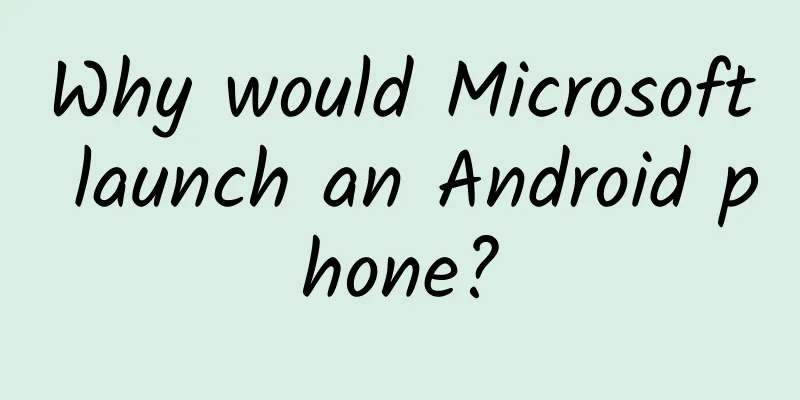Why would Microsoft launch an Android phone?

In response to a question from Wired magazine reporter Lauren Goode about whether Microsoft has plans to revive a Windows mobile operating system in the future, Microsoft CEO Satya Nadella firmly denied it. He said that for Microsoft, the App model and experience are more important - this is particularly evident for the Surface Duo released by Microsoft on October 2, 2019. So, for this symbolic product, Microsoft chose Android. The thinking behind Surface Duo In fact, at Microsoft's New York conference on October 2, 2019 (see previous report by Leifeng.com), Microsoft Chief Product Officer Panos Panay released a total of six products; four of them were updates or extensions of Surface's existing product forms, while Surface Neo and Surface Duo became the two major surprises of the conference with their foldable appearance design and the resulting operating system changes. However, Surface Neo essentially continues to innovate hardware and software within the Windows 10 ecosystem, and the newly launched Windows 10X operating system does well reflect Microsoft's thinking on dual-screen collaboration. But Surface Duo is the first to break through the inherent boundaries of Surface as a Windows 10 system carrier and build the operating system on Android, which is dominated by another technology giant, Google. From this perspective, the strategic significance of Surface Duo is even greater. So, what kind of product is Surface Duo? In terms of appearance, Surface Duo is a foldable dual-screen mobile device that supports making and receiving calls. It is equipped with two 5.9-inch LCD screens on the left and right, which together make up an 8.3-inch screen. But in fact, the two screens are not connected, but can be flipped 360 degrees through a hinge in the middle - of course, there is a striking Surface logo on the outside of the body. In terms of configuration, Surface Duo is equipped with a Qualcomm Snapdragon 855 processor and has a front camera, but it is not yet certain whether it has a rear camera, and many other product configuration information is still vague - after all, this is a device that will not be released until the 2020 holiday season. From the perspective of software interaction, Surface Duo does not run the Windows system, but is equipped with a dual-screen Android system jointly created by Microsoft and Google, with a built-in Google Play application store, and of course Microsoft's Edge browser, Outlook and other applications; but from the perspective of interaction, this system can achieve a good collaborative division of labor on the two screens, and one of the screens can be transformed into a keyboard and game control buttons at any time (of course, this also requires the adaptation of the developer). In Leifeng.com's opinion, Surface Duo is obviously a smartphone, although Microsoft avoided using such a term at the press conference. In an interview with Wired magazine, Satya Nadella and Panos Panay did not see the Surface Duo as a competitor to traditional mobile phones, but talked about its creativity and productivity. Panos Panay said that he had never thought about building a single-screen smartphone. Based on the productivity of the latter, dual-screen phones are actually the opposite of single-screen phones: The idea is, I want to help you be more creative and more productive. That doesn't mean there's a high-megapixel camera on the back of the product. It means I can get you into the flow so you can create without having to step out of the scene. Satya Nadella said:
In addition, it is worth mentioning that according to Panos Panay, Microsoft has invested two and a half years in the development of this Surface Duo. Why did Microsoft choose Android? As a smartphone running the Android operating system, Surface Duo is not so unique among its peers; after all, similar dual-screen foldable products have appeared in the Android camp, such as ZTE AXON M. In fact, the real key significance of this product is that it represents Microsoft's thinking and choice for the mobile ecosystem, and Microsoft's choice is Goolge's Android. As foreign media said, this is a victory for Google - in Leifeng.com's view, this is a victory officially recognized by Microsoft. Panos Panay said in an interview that Microsoft no longer intends to build a mobile operating system based on the Windows application ecosystem. The fundamental reason is that the pattern of the mobile application ecosystem has been determined. He said:
Satya Nadella said:
Despite the difference in perspective, it is clear that both people are pointing to the same point - in the mobile field, Microsoft is no longer obsessed with control over the operating system and application ecosystem. It has acknowledged the reality and used the launch of Surface Duo to acknowledge the victory of Android dominated by Google. In fact, perhaps before Microsoft gave up Windows Phone (Windows 10 Mobile), it made the decision to embrace Android and iOS. Shortly after Satya Nadella took office, Microsoft launched a series of apps for Android and iOS; of course, due to the closed nature of iOS, Microsoft later began to embrace Android (with Samsung as the main partner) - then Microsoft gradually progressed, first pre-installing Microsoft apps on Samsung phones, and then launching the Microsoft version of Galaxy S8. The most recent cooperation between the two parties is based on the seamless connection between Galaxy Note 10 and Windows 10. With Surface Duo, Microsoft no longer relies on partners, but instead jumps into the Android application ecosystem itself. It is worth mentioning that the statement from a Google spokesperson regarding Microsoft’s choice of Surface Duo seemed quite official and calm:
Summarize As Microsoft enters the Android camp on the mobile side, a question worth pondering is: Is the operating system still important to Microsoft? Obviously, on the desktop side, the Windows operating system is still very important and indispensable to Microsoft, because it constitutes the foundation of Microsoft's development, and this foundation is already very solid; on the mobile side, Microsoft has long realized that it has no chance in the field of operating systems. Since it has already lost to its competitors, it might as well join them. In other words, whether it is the desktop or mobile side, the operating system pattern has been determined. Instead of working in vain, it is better to go with the flow - this is very consistent with Satya Nadella's open strategy, and it is also a pragmatic way to seek change. After all, Microsoft has placed its future in the cloud. This article is reproduced from Leiphone.com. If you need to reprint it, please go to Leiphone.com official website to apply for authorization. |
<<: 8 years after Steve Jobs' death, is Tim Cook a qualified Apple CEO?
>>: Why are 5G mobile phones not selling well?
Recommend
In 2020, beware of suffering from "traffic anxiety"!
With the disappearance of traffic dividends, the ...
Moyu Thinking Douyin gained 150,000 followers in 40 days, and realized 30,000+ in cash. Replaying the game, he can earn at least hundreds of thousands more a year
Moyu Thinking Douyin gained 150,000 followers in ...
360 search advertising promotion daily budget modification settings!
What is a daily budget? The daily budget is the m...
2019, top ten marketing keywords!
In a blink of an eye, 2019 is coming to an end As...
18 tips for writing a good beginning and ending for a public account article!
A few days ago, I saw someone say on Zhihu: "...
The "Yellow River Elephant" in the primary school textbook has a "saber-toothed" appearance that is totally unworthy of its name!
In the elementary school Chinese textbook, there ...
How can the Qianchuan Project pass review quickly? Top 10 most frequent violations of the Big Data
As the saying goes: Even heroes have difficulty r...
Weilai delivers more than 10,000 cars this year. He Xiaopeng is willing to admit defeat: ES8 purchase money will arrive soon
Yesterday, NIO just announced that the delivery v...
You can make money by donating your shit, and earn a high-end mobile phone every month. How much money can your poop get you?
Some time ago, a piece of news like this became a...
In addition to catching up on sleep after staying up late, you can also choose to "drink a cup of tea"
After staying up late, many people think of "...
Well-known APP marketing director teaches you: How to plan an efficient marketing operation plan
What? Reading and understanding this article can ...
Growth Hacking: How to Increase User Conversions?
Growth Haker is no longer a strange term. The ori...
In the Tianan Society Yongxing Zhuhai incident, why did Erlu apologize to Tianan Yongsheng?
What your father said about two brothers each hav...
Why does my phone automatically remind me when the battery level is below 20%?
The "greatest pain" in life is that you...
There are so many promotion channels, how can we combine them to maximize traffic!
Currently, the total number of mobile app users h...






![[Li Jiaoshou] In the era of content e-commerce, you must understand the four changes in "consumer preferences"!](/upload/images/67cc3d00663e8.webp)


